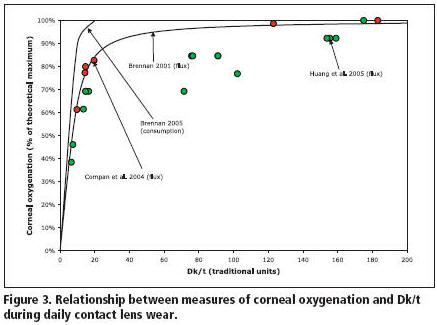Contact lenses are wonderful devices. They allow us to see clearly without needing to fuss with glasses. The very first contact lenses that were invented were terrible for our eyes but people still wanted to wear them to get away from glasses! They've come a long way but contact lenses still carry a risk and people still can, and do, go blind from using them improperly.
Why am I telling you all that? To remind you the importance of a proper contact lens assessment by a contact lens fitting optician, an optometrist or an ophthalmologist.
What does that have to do with subscription contacts?
"... an improperly fitting contact lens can lead to vision loss."
Ordering your contacts from a subscription service may seem like a great idea but you must make sure that a professional is checking the fit of them on your eye. The problem, and the problem with all online orders, is they currently do not require you to provide a proper, up to date contact lens prescription (which IS different from your glasses prescription) to order a supply! That means you can order without anyone checking them on your eye! Many people assume if a contact lens doesn't fit them, they'll know. Sadly, that isn't true and an improperly fitting contact lens can lead to vision loss.
"Some Subscription contacts only provide 30-40% of the oxygen your eye needs which just isn't enough. Modern contacts allow 80-100% of the oxygen to your eye."
It's also vital to discuss your contact lens and vision needs with your doctor. We've studied a long time to understand how contacts and the eye work best! For example, did you know that the material used in the largest subscription contact lens service, methafilcon A, is a very old material that doesn't breathe well? That can cause the cornea, the front clear part of the eye, to swell. A swollen cornea has an increased risk of infection. That's no good.
Essentially the lower the Dk/t, the less oxygen that gets to the eye. The lens used by a major subscription contact lens service is made with a material, Methafilcon A, with a Dk/t of only 18. Compare that with a different material, etafilcon A, found in Acuvue 1 Day Moist with a Dk/t of 28 which doesn't sound much better but when we check the graph, the curve is so steep that a Dk/t of 28 means we jump from 30-40% of the oxygen the eye needs when we have a Dk/t of 18 all the way to 80%. Modern lenses have a Dk/t of more than 100. What that means is with a subscription lens your cornea only gets between 30-40% of the oxygen it needs. With a modern lens, you get 90-100%.
But they're so cheap, right? Maybe. Let's do the math.
"Cheaper? Think again! A common subscription contact lens service costs $528/year. A year supply of dailies from Eye Spy costs only $460/year."
In Canada, a common subscription contact lens service costs you $40/month plus $4 shipping. Over 12 months that means you've spent $528 on your daily contact lenses.
Compare that to an equivalent daily lens at our office, the Acuvue 1 day Moist. A year supply from us costs you $560. I can hear you saying, "Aha! That costs more!" and you're right! But here's the thing, Acuvue offers a $100 rebate on a year supply of contacts which brings your cost down to only $460 for a year supply. Even better, we can direct bill to your insurance provider which lowers your out of pocket expense even more.
At the end of the day, you get to choose what you think is best for your eyes and your health. You get to decide where you want to purchase your contacts and glasses and that's okay! My job, and the job of eye care professionals everywhere, is to make sure you're making an informed decision. Subscription lenses aren't cheaper, they aren't healthier and they aren't safer but they are convenient and it's a neat idea to have contacts show up on your doorstep every month.
If you have questions about subscription contacts, any contact lens, or anything else feel free to contact us on Twitter, Facebook, Google +, via our website or phone us at (403) 474-6744.


